The job description for an environmental engineer is all about protecting the environment. These engineers help keep our air, water, and soil clean. They solve problems like pollution and waste management.
What Does an Environmental Engineer Do?
An environmental engineer helps protect the earth. They work on keeping our air, water, and soil clean. They also solve problems like pollution and waste management.
What Are the Main Responsibilities of an Environmental Engineer?
Environmental engineers have many important jobs:
- Design Projects: They plan and design projects to help the environment. This might include building systems to clean water or control air pollution.
- Conduct Research: They study environmental problems and look for new ways to solve them.
- Ensure Compliance: They make sure projects follow all the environmental laws and regulations.
- Monitor Impact: They check how projects affect the environment and find ways to reduce any negative effects.
What Skills Are Needed to Become an Environmental Engineer?
To be an environmental engineer, you need several key skills:
- Analytical Skills: You must be good at analyzing data and solving problems.
- Problem-Solving Skills: You need to find solutions to complex environmental issues.
- Communication Skills: You have to explain your ideas clearly to others, like scientists and project managers.
- Technical Skills: You should know how to use special tools and software for environmental work.
Environmental engineers play a big role in protecting our planet. They use their skills to solve environmental problems and help keep the earth clean and healthy.
What Education Is Required?
To become an environmental engineer, you need to go to college. Here’s what you need to do:
- Bachelor’s Degree: First, you need a bachelor’s degree in environmental engineering or a similar field. This means studying for about four years.
- Special Licenses or Certifications: Some jobs might require you to get special licenses or certifications. These are extra tests or courses that show you have special knowledge and skills.
- Advanced Courses: Many environmental engineers continue to learn even after they finish college. They take advanced courses or go to workshops. This helps them learn new information and technologies.
Where Do Environmental Engineers Work?
Environmental engineers can work in many different places. Here are some common places where they work:
- Government: Some environmental engineers work for the government. They help make rules to protect the environment and make sure people follow them.
- Private Companies: Many environmental engineers work for private companies. They help these companies follow environmental laws and find ways to reduce pollution and waste.
- Nonprofit Organizations: Some work for nonprofits. These are groups that work to protect the environment. They often work on special projects to help the earth.
Work Environment:
- Offices: Environmental engineers often work in offices. They plan projects, do research, and write reports here.
- Fieldwork: They also spend a lot of time outside doing fieldwork. This means they go out to check on projects, collect samples, and see how their work affects the environment.
Teamwork:
Environmental engineers work with many other people. They might work with scientists, urban planners, and construction workers. They need to be good at working in teams and explaining their ideas to others. This helps make sure their projects are successful and protect the environment.
The Job Outlook for Environmental Engineers
The job outlook for environmental engineers is good. Here are some reasons why:
- Growing Need: More people are becoming aware of environmental issues.
- Government Rules: Governments are making more rules to protect the environment. Companies need environmental engineers to help them follow these rules and avoid fines.
- Green Projects: There are more projects focused on renewable energy, like solar and wind power. Environmental engineers are needed to design and manage these projects.
- Job Growth: The number of jobs for environmental engineers is expected to grow faster than average compared to other jobs. This means it is a good field to enter if you like helping the environment.
Common Projects for Environmental Engineers
Environmental engineers work on many different projects to protect the environment. Here are some common projects they work on:
- Water Pollution Control: Environmental engineers design systems to clean dirty water.
- Air Pollution Control: They work on ways to reduce air pollution. This might include designing systems to clean the air from factories or cars.
- Waste Management: Environmental engineers find ways to manage waste. They might design recycling programs or systems to safely dispose of hazardous waste.
- Renewable Energy Projects: They work on projects that use renewable energy, like solar panels and wind turbines.
- Climate Change Mitigation: Environmental engineers work on projects to reduce the effects of climate change mitigation. This might include designing systems to capture greenhouse gases or developing ways to make buildings more energy-efficient.
Environmental engineers do important work to help protect our planet. They use their skills to solve problems and make the world a cleaner, healthier place.
Tools and Technology Use
Here are some common ones:
- Environmental Modeling Software: This software helps engineers create computer models of the environment. They use these models to predict how different projects will affect the air, water, and soil remediation.
- Geographic Information Systems (GIS): GIS is a tool that helps engineers map and analyze data about the earth.
- Monitoring Equipment: Environmental engineers use special equipment to measure pollution. For example, they might use air quality monitors to check for harmful gases or water testing kits to see if water is clean.
- Sampling Tools: They use tools to collect samples of soil, water, and air. These samples are then tested in a lab to check for pollution or other problems.
- Computer Software: Programs like AutoCAD help them create detailed plans for environmental protection projects.
How Do Environmental Engineers Contribute to Sustainability?
Environmental engineers help make our world more sustainable development. Here are some ways they help:
Promoting Renewable Energy:
They work on projects that use renewable energy sources like solar and wind power. These projects help reduce our use of fossil fuels, which are bad for the environment.
Improving Waste Management:
Environmental engineers design systems to recycle more materials and reduce waste. They also find safe ways to get rid of hazardous waste disposal, which protects the earth and people’s health.
Reducing Pollution:
They create systems to clean polluted air and water. For example, they might design a water treatment plant that removes harmful chemicals from drinking water or a system that reduces emissions from factories.
Designing Sustainable Buildings:
They help design buildings that use less energy and water. These buildings are better for the environment and save money on energy bills.
Restoring Ecosystems:
Environmental engineers work on projects to fix damaged ecosystems. For example, they might help clean up an oil spill or plant trees in a deforested area.
By doing these things, environmental engineers help create a healthier planet.
For more information on related careers, you can check out the job description for a software engineer intern, the job description for a nuclear engineer, and the job description for a network engineer.
Average Salary for an Environmental Engineer
Environmental engineers earn good salaries. Here are some examples of how much they can make in the United States:
- Indeed: The average salary for an environmental engineer is between $62,000 and $130,000 per year.
- Salary.com: Entry-level environmental engineers can earn between $57,000 and $94,000 per year.
- Glassdoor: On Glassdoor, the average salary for environmental engineers ranges from $94,000 to $160,000 per year (source).
- ZipRecruiter: In Ohio, environmental engineers earn between $58,000 and $120,000 per year.
These salaries can change based on where you work and how much experience you have.
Environmental engineers help protect our planet and earn a good salary for their important work.
Environmental Engineer Benefits
Being an environmental engineer comes with many benefits:
- Help the Planet: They protect the earth by reducing pollution and waste.
- Good Salary: Environmental engineers earn good money for their important work.
- Job Growth: There are many job opportunities in this field.
- Variety of Workplaces: They can work for the government, private companies, or nonprofits.
- Use of Technology: They use cool tools and green technology to solve problems.
- Teamwork: They work with scientists, planners, and construction workers.
Environmental engineers have rewarding careers that help make the world a better place.
Sample Job Description for an Environmental Engineer
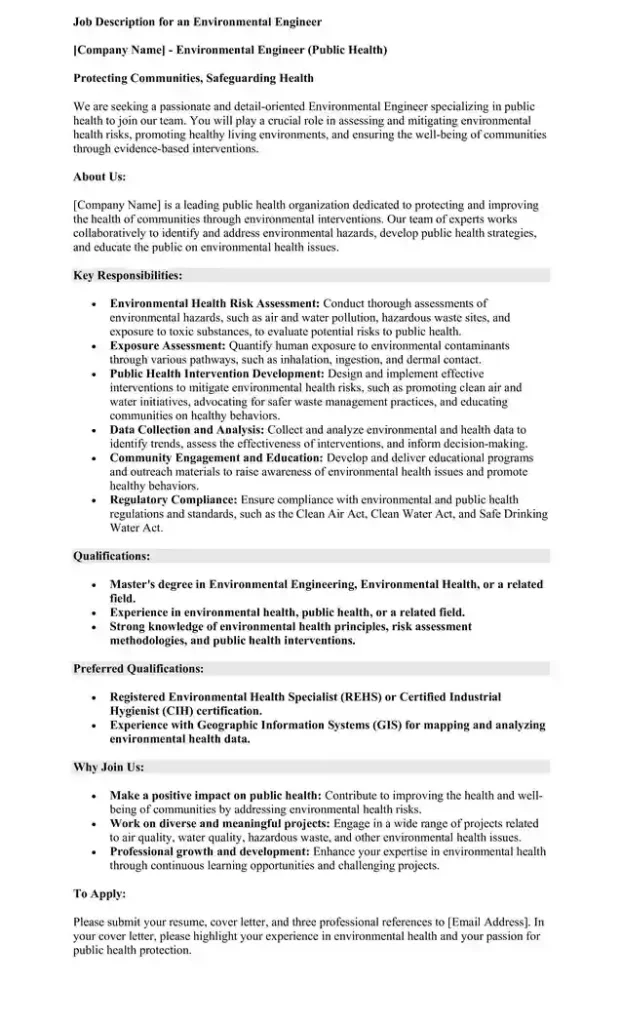
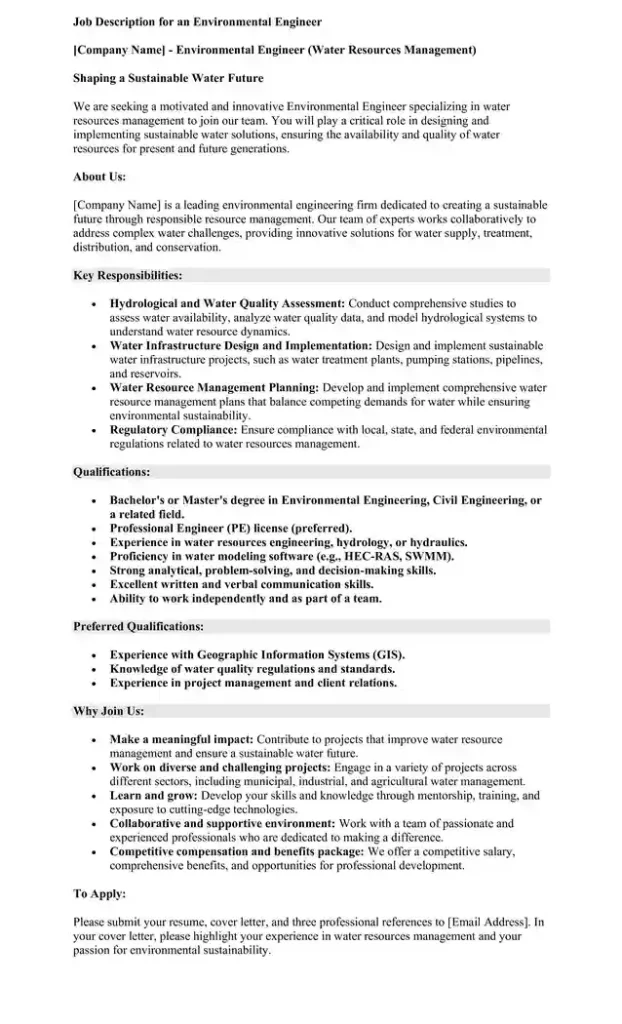
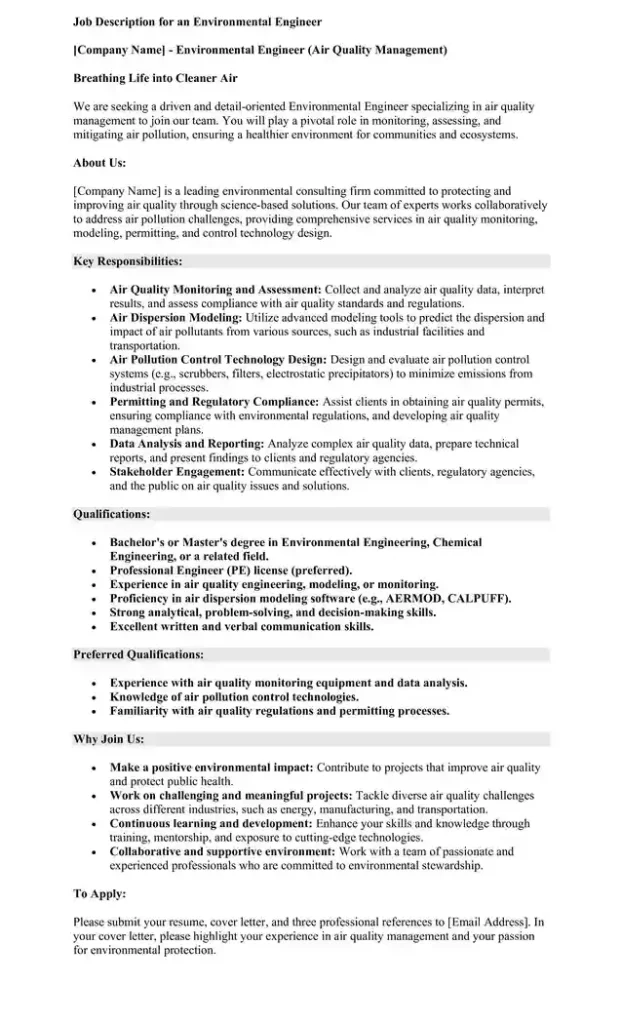
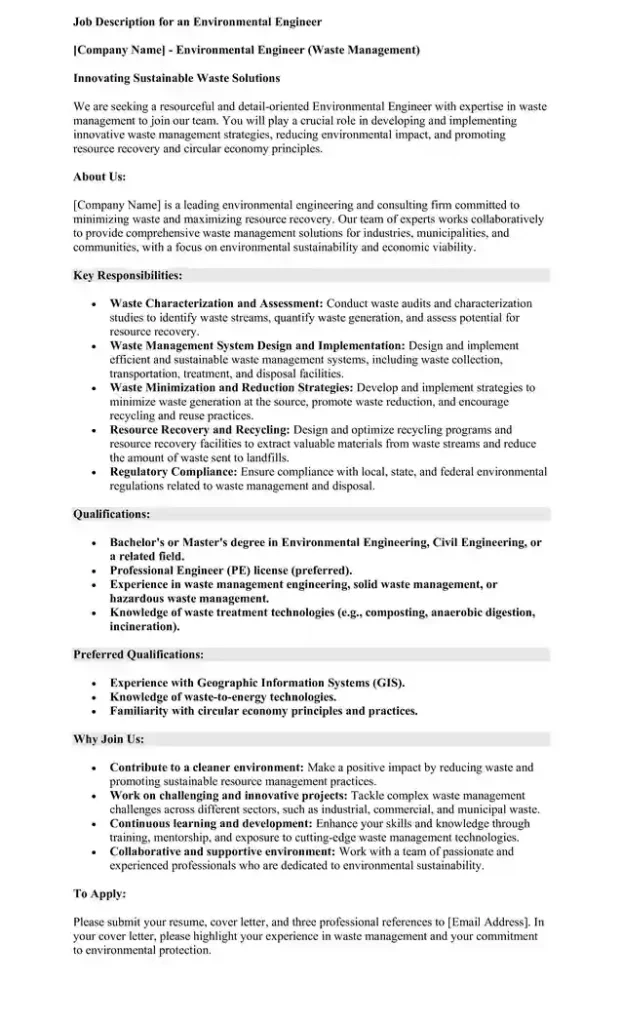
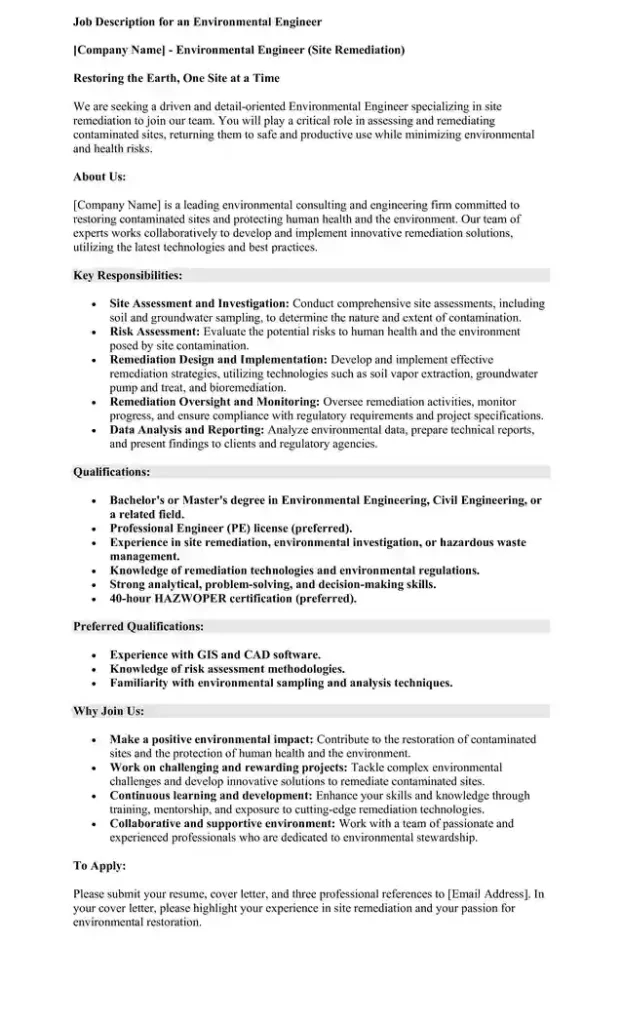
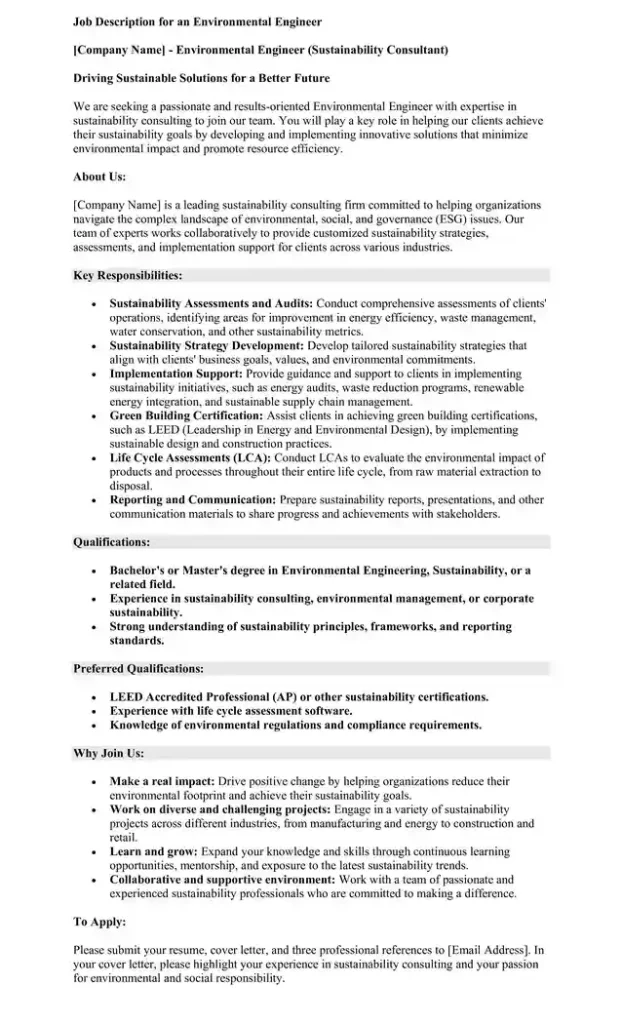
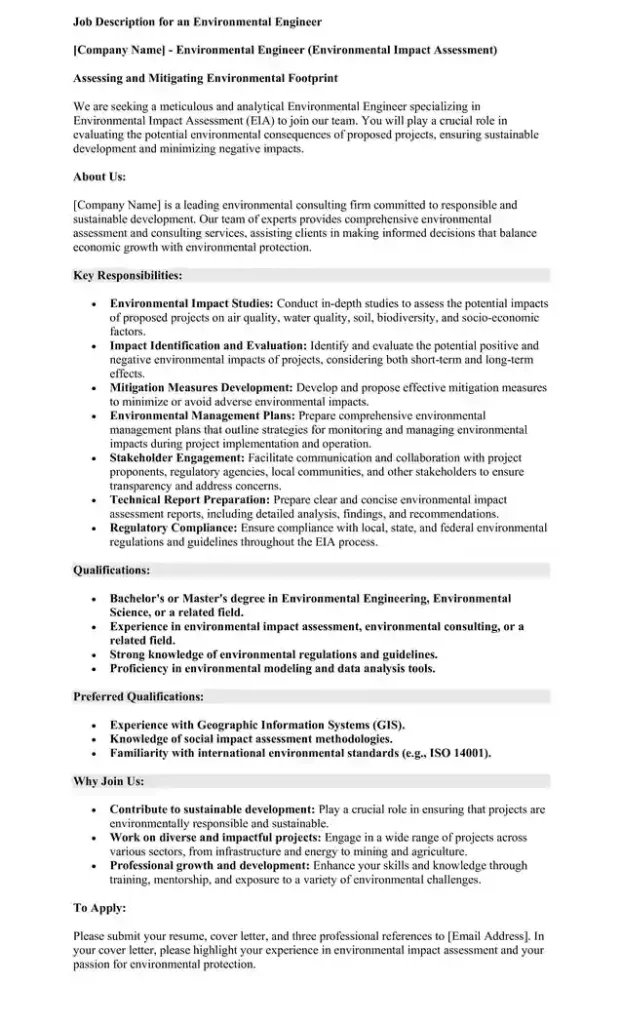
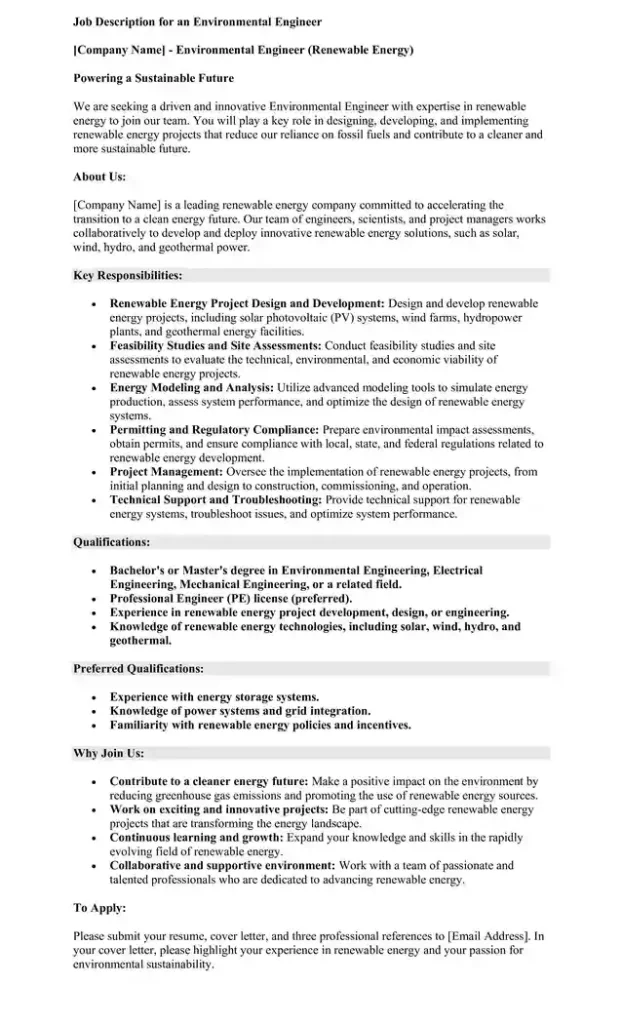
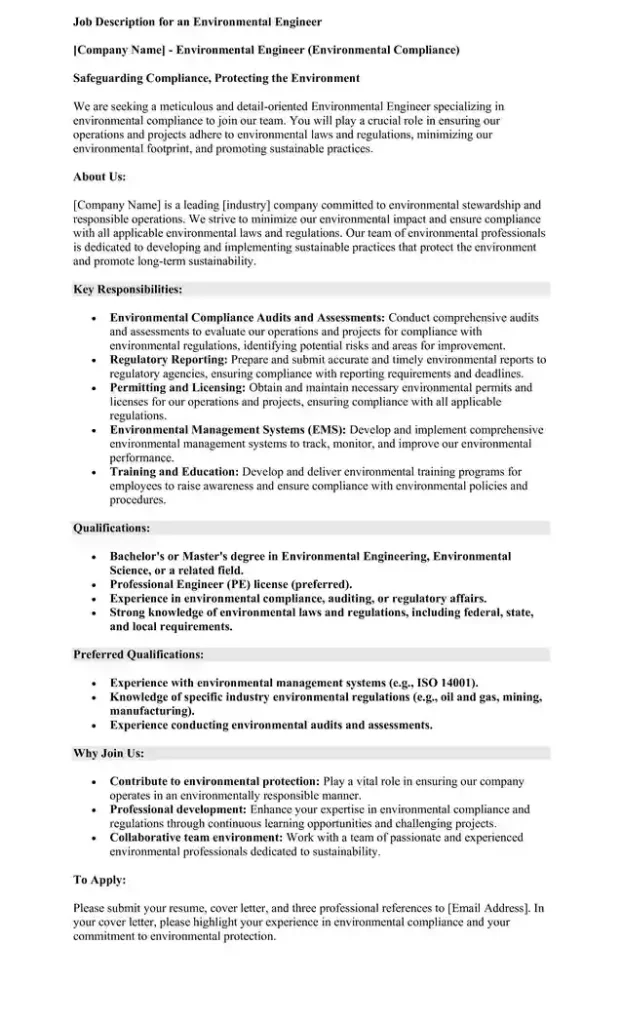
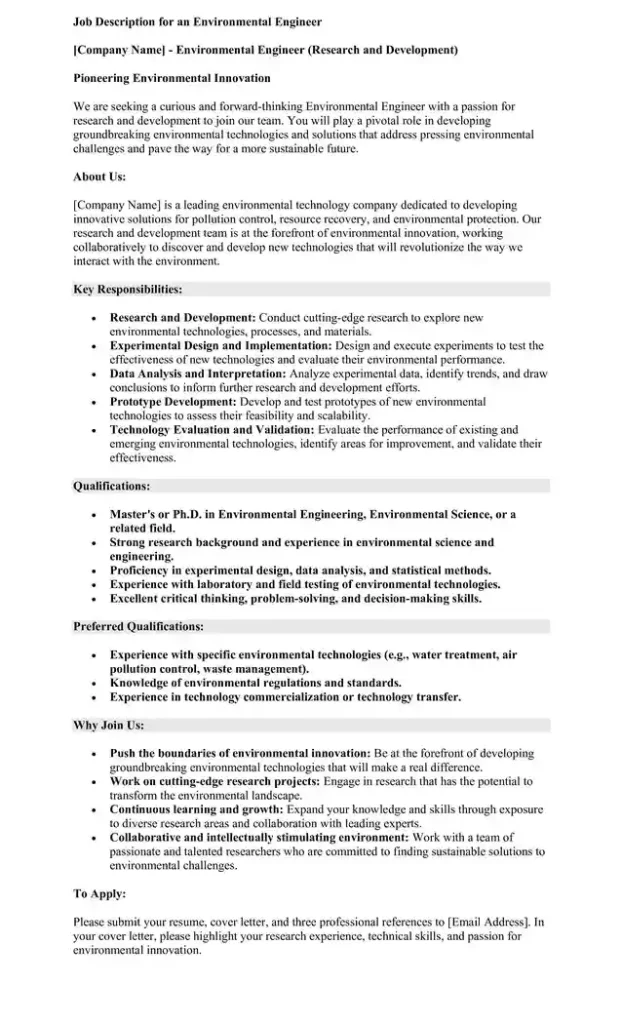
Conclusion
The job description for an environmental engineer shows how they help make our planet healthier. They use their skills to solve environmental problems and support sustainability, creating a cleaner world.

Alexander is a skilled HR expert who writes clear and compelling job descriptions. He has spent over 15 years in the HR field, helping companies find and keep the best employees. With a degree in Human Resources Management from the University of Chicago, he has the knowledge to back up his experience.








